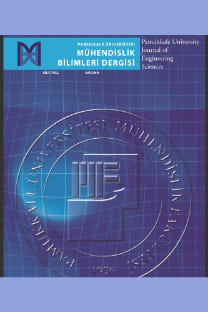Evrimsel algoritma performanslarının güç akışı analizinde karşılaştırılması
Optimum güç akışı problemi, Optimizasyon, Valf yükleme etkisi, Yakıt maliyeti
Comparison of the evolutionary algorithm's performances on power flow analysis
Optimal power flow problem, Optimization, Valve point effect, Fuel cost,
___
- Carpentier J. "Contribution to the economic dispatch problem". Bulletin de la Societe Francoise des Electriciens, 3(8), 431-447, 1962.
- Sun DI, Ashley B, Brewer B, Hughes, A, Tinney W. "Optimal power flow by newton approach". IEEE Transaction on Power Apparatus and Systems, 103(10), 2864-2880, 1984.
- Habiabollahzadeh H, Luo GX, Semlyen A. “Hydrothermal optimal power flow based on combined linear and nonlinear programming methodology”. IEEE Transaction on Power Apparatus and Systems, 4(2), 530-537, 1989.
- Momoh JA, El-Hawary ME, Adapa R. “A review of selected optimal power flow literature to 1993. II. Newton, linear programming and interior point methods”. IEEE Transactions Power Systems, 14, 105-111, 1999.
- Bakistzis A, Biskas P, Zoumas C, Petridis V. "Optimal power flow by enhanced genetic algorithm". IEEE Transaction on Power Systems, 17, 229-236, 2002.
- Abou EEA, Abido M, Spea S. "Optimal power flow using differential evolution algorithm". Electrical Engineering, 91(2), 69-78, 2009.
- Abido M. "Optimal power flow using particle swarm optimization". International Journal of Electrical Power & Energy Systems, 24(7), 563-571, 2002.
- Roa-Sepulveda C, Pavez-Lazo B. "A solution to the optimal power flow using simulated annealing". International Journal of Electrical Power & Energy Systems, 25(1), 47-57, 2003.
- Sinsuphan N, Leeton U, Kulworawanichpong T. "Optimal power flow solution using ımproved harmony search method". Applied Soft Computing, 13(5), 2364-2374, 2013.
- Aruldoss T, Victoire A, Jeyakumar AE. "Hybrid PSO-SQP for economic dispatch with valve-point effect". Electric Power Systems Research, 71(1), 51-59, 2004.
- Nikham T, Narimani M, Azizipanah-Abarghooee R. "A new hybrid algorithm for optimal power flow considering prohibited zones and valve point effect". Energy Conversion and Management, 58, 79-95, 2012.
- Karaboga D. "An Idea based on honey bee swarm for numerical optimization". Computer Engineering Department, Erciyes University, Erciyes, Turkey, Technical Report, TR06, 2005.
- Yang X, Deb S. "Cuckoo Search via lévy flights". World Congress on Nature & Biologically Inspired Computing, Coimbatore, India, 9-11 December 2009.
- Yang X, He X. "Firefly algorithm: recent advances and applications". International Journal Swarm Intelligence, 1(1), 36-50, 2013.
- Goldberg D. "Real-Coded genetic algorithms, virtual alphabets, and blocking". Complex Systems, 2, 139-168, 1991.
- Yang X. Harmony Search as a Metaheuristic Algorithm. Editors: Geem ZW. Music-Inspired Harmony Search Algorithm, 1-14, Berlin, Heidelberg, Germany, Springer, 2009.
- Kennedy, J, Eberhart RC. “Particle swarm optimization”. Proceedings of IEEE International Conference on Neural Networks, Piscataway, New Jersey, USA, 27 November-1 December, 1995.
- Kirkpatrick S, Vecchi M, Gelatt C. "Optimization by simulated annealing". Science, 220(4598), 671-680, 1983.
- Storn R, Price K. "Differential Evolution-a Simple and Efficient Adaptive Scheme for Global Optimization over Continuous Spaces". International Computer Science Institute, Berkley, USA, Technical Report, TR95, 1995.
- Power Flow Test Cases, IEEE 30-Bus Test System Data. https://www.ee.washington.edu/research/pstca7pf30/ pg_tca30bus.htm (10.09.2015).
- The MathWorks Inc. “MATLAB (2007)”.
- Niknam T, Narimani MR, Azizipanah-Abarghooee R. “A new hybrid algorithm for optimal power flow considering prohibited zones and valve point effect”. Energy Conversion and Management, 58, 197-206, 2012.
- ISSN: 1300-7009
- Başlangıç: 1995
- Yayıncı: PAMUKKALE ÜNİVERSİTESİ
LiDAR sensörünün hiperspektral verilerden gölgelik alan çıkarımı başarımına etkisi
Seniha Esen YÜKSEL, Mustafa BOYACI
İnverter klima akıllı etkileşim sistem tasarımı
Murat TAŞKIRAN, Nihan KAHRAMAN, Halime USTA YOĞUN
Nesnelerin interneti: Gelişimi, bileşenleri ve uygulama alanları
Muhammed Zekeriya GÜNDÜZ, Resul DAŞ
Fırçasız doğru akım motorunun hız kontrolü için uyarlamalı geri adımlamalı kontrolcü tasarımı
Ağ yönlendiricileri için çoklu eşik kullanan geçişsiz öncelikli zamanlayıcı
Mathematical modeling and dynamic decoupling of a multivariable process with a CST
Bulut bilişimde veri madenciliği tekniklerinin uygulanması: Bir literatür taraması
Nesnelerin internetine genel bir bakış: Kavram, özellikler, zorluklar ve fırsatlar
